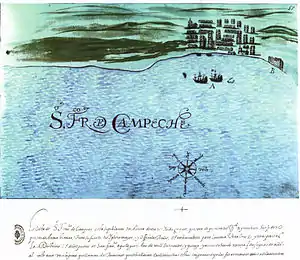Tomás de Cardona
Tomás de Cardona, a native of Venice and living in Seville, was a rich explorer, trader, and teacher of Spanish royal palace from the 17th century, who invested a fortune in a company to exploit the pearl banks in California.[1]
.jpg.webp)

In 1611 he was granted an "encomienda" from Philip III of Spain to create a company to exploit the pearl banks of California by committing to: certain important company in the service God, if the result was positive, make the evangelization of the whole southern part and the vast kingdom of the Californias ". In 1612 he signed an agreement with the viceroy to find new banks of pearls, look for the lost galleons from general Luis Fernandez de Cordoba, and explore the rich kingdom of the California.[2]
He offered the male members of his family to enter the company, and sent six ships from Cadiz. His nephew Nicolas de Cardona concluded the trip, returning to California in 1623, making a report to the king that has survived up to our days.
Tomas Cardona succeeded Francisco Velázquez Guillamas the 31 December 1622 as a teacher of chamber of the court.[3] In 1633 Felipe IV of Spain issued a decree forcing treasurers of the houses of the king and queen to present its accounts to the Royal accountancy. In March 1634, the Royal accountancy demanded Tomas Cardona, chamber master and captain, to submit his accounts for the period 1629-1633. Cardona he could not accomplish it until the autumn of that year, being in a bad position until then.[4]
See also
Notes
- Unam, Viajes y noticias californianas
- General History of Spain and America, Volume 9, Part 2, page 110
- UAM, / alphabetical list of the servants of the house of Queen Marguerite ALPHABETICAL austria.pdf RELATIONSHIP OF THE HOUSE servants Queen Margaret of Austria (1599-1611) Archived 2008-12-10 at the Wayback Machine
- Institute for Fiscal Studies, THE ECONOMY OF THE COURT. THE REAL COST OF HOUSE IN THE MODERN AGE (1561-1808) Archived 2010-03-29 at the Wayback Machine
References
- Cardona "Geographic Descriptions", by Michael Mathes, ISBN 0-87093-235-7